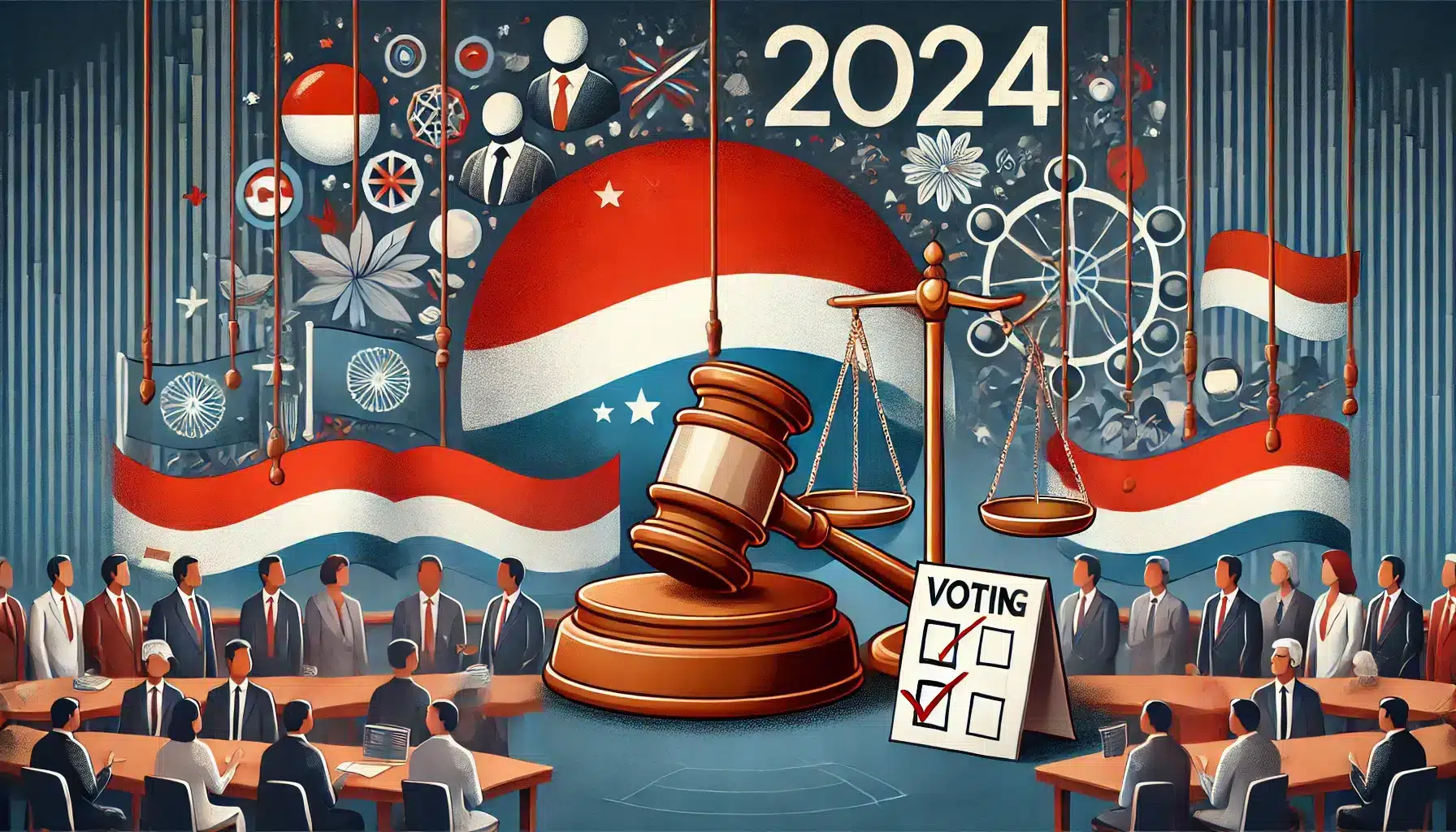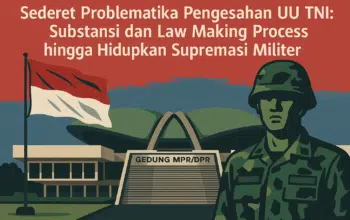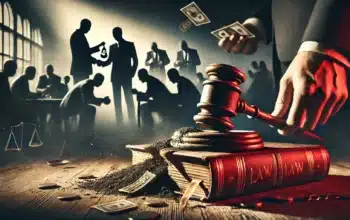Literasi Hukum – This article discusses the political phenomenon of the 2024 election, including reflections on the Constitutional Court’s decision, conflicts of interest, public opinion, and the internal and external factors affecting the decline of democracy. It also explores the importance of political and legal reforms and the future of democracy in the context of Indonesian politics ahead of the 2024 election.
The Constitutional Court Decision: A Reflection
The decision of the Constitutional Court, which has been pronounced and decided openly to the public and has been decided on 16 October 2023 for approximately 7 hours, leaves reflective questions. This question targets the Constitutional Court as a law enforcement institution that has decided its decision based on the Constitution, but the probability of the public’s response to this decision certainly varies. This variety of responses does not prevent the aggregation of political and legal conceptions in political-legal issues ahead of the general election for President and Vice President.
The limits and qualifications set according to legal regulations remain a debate that has not yet ended. Many assumptions are aggregated, but few can be realized. Realizing the context of the petition submitted by the petitioners, what kind of basis it is, and the basis for reasons that the petitioners consider sufficient to state that the constitutional rights of the petitioners have been violated regarding a normative formulation of statutory regulations. Of course, society, in general, seems to be led to generalized assumptions. Society cannot present the flow and framework of its assumptions in a more basic manner.
Conflicts of Interest and Public Opinion
Almost all people stated that the context of the application to test the formula for setting the age limit for nominations for presidential and vice-presidential candidates was very steeped in conflicts of interest. The interests referred to here are only agreed upon in a very narrow sense, namely marital or blood relations or kinship relations drawn into political power relations. It still cannot be said that enough people are questioning the direction and purpose of the petitioners’ interests, and certain political parties are submitting these petitions to the Constitutional Court.
The issue of age limits is only brought into the flow of thought patterns that target certain political figures or those currently in office without ever wanting to debate matters of interest in a very contentious political context (constraints of interests). Not only that, public opinion is also at stake in politics and political interests. Does anyone question how law and politics are related to each other, law which should be able to transcend its rigidity and politics which should not limit its flexibility to the variety of possibilities that occur. Yes, law and politics are a phenomenon.
Responding to the Phenomenon
This phenomenon needs to be responded to without overwhelming turmoil by simply speaking out or fighting from the crowd in front of the government building. This phenomenon refers to Charles Taylor’s thoughts in formulating a demos reaction that is mobilized to fight a system that does not take their interests into account. The community must be invited to open the cage of communal recognition which does not show the existence of healthy and fresh thinking constructions. Apart from that, political movements must also be renewed, the public must be invited to understand that formal requirements are not a limitation for all citizens, including the younger generation, to take part.
Every community is given an equal share of opportunities to be involved in governance. Within the limits of reasonable reasoning, giving meaning to certain qualification standards shows a decline in the meaning of democracy. This decline in democracy occurred not because of the minimal capacity of leaders or simply because of external pressures such as massive economic changes, changes in the geopolitical situation, destabilization of national institutions, manipulation of the media and information systems and increasingly intensive inequality.
External and Internal Factors in Democracy’s Decline
Factors in the decline of democracy do not only come from external factors but also include internal factors. The external factors accused are populism, neo-liberal capitalism and new communication media, especially social media. Meanwhile, the internal factor that is the problem is the ambiguity of the word demos which refers to power that cannot be controlled, even though democracy is an aspiration or ideal that is determined by guiding standards but is never achieved.
Democracy experiences dynamics of ups and downs so that what emerges is the issue of democracy as a goal (telos). The teleological concept of democracy (democracy as a goal) which then directs itself to the goal to be achieved but which can never be fully achieved.
Unequal Elite Power and Democracy
The decline of democracy is also related to the causes and consequences of unequal elite power. The principle of equal opportunities should not be an influence on justifying ever-widening inequalities in the name of freedom, equality, and solidarity. All three should be able to be developed within the framework of a practical balance of power which should not be separated from the social context of society.
Thus, in the current political problems ahead of the five-yearly simultaneous elections in 2024, political reforms must be carried out immediately and legal reforms must also be immediately improved. The first time in the context of political party reform must be carried out with a more radical approach, namely deconstructing political parties. What is meant by deconstruction is an effort to fundamentally change the structure and culture of political parties.
Political Parties and Legal Reform
The hegemony and arrogance of political parties that have persisted for so long must end immediately. Political parties are not states within states that are free from political interference from the state and the people. Political parties are not also superstructures that only have the ambition to regulate all political principles in all areas of life in the social order.
Apart from the deconstruction of political parties, another aspect that needs to be a point of improvement is legal reform which makes legal provisions the starting point for theorizing about law with a wide scope of explanation, not just confined to words, principles, and doctrine. The study of legal substance requires perspectives and methods that are no longer doctrinal legal as a theoretical starting point.
The Role of Law in Society
The law speaks about what is “right”, “good”, and “appropriate” from the point of view of human language and understanding. Law speaks about humans who create and use the law with all the complexity of their lives. Legal studies necessarily involve all complexities relating to social, cultural, political, and economic matters. Clearly, law stands between two points, namely humans and rules. Therefore, the law must be able to move towards explanation when it touches the struggle point of social human. Legal studies must not be imprisoned in legal-formal cages but must be able to move into its scientific habitat which continuously explains legal realities in a human setting.
The Future of Democracy
By directing democracy in these two directions of political and legal reform, the hardware of democracy cannot be polished simply by imitating or grafting on other countries’ democratic models. The ambiguity of the meaning of democracy which in terms of contradiction emphasizes the “demos” (the people) as the foundation for the development of democracy. The fact that democracy has developed recently has declined and is worrying. Society should not be led to an aggregation of opinions that mutually justify and acknowledge each other until they become a general conception of thinking.
The particularity of the assumption is a further basis that should be taken into consideration when evaluating the recent decline in democracy. Various incidents and happenings that occur during ongoing preparations and consolidation for the implementation of the upcoming 2024 elections need to be addressed maturely and not just temporary turmoil that leads to permanent functionalization of democracy and not moving towards developing democracy (developmentalist of democracy). So, after the decision and pronouncement of the Constitutional Court’s decision today, is democracy still possible or is it at a worrying level?







